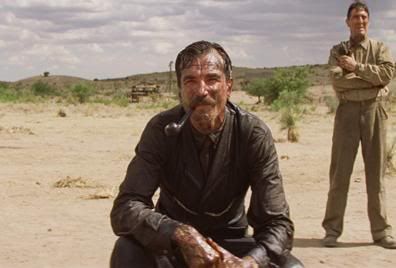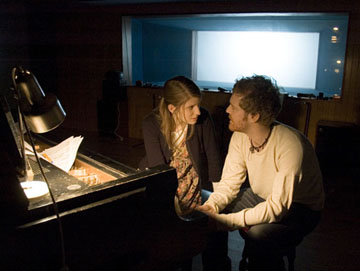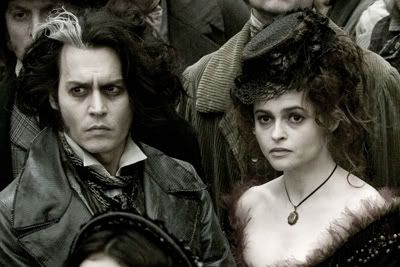
Critics often throw around the expression "tour de force" when discussing performances. I've used it myself several times in my film reviews. I am now, however, feeling somewhat regretful for having done so. I should have saved those words for this review because, up until now, no one has quite deserved them like Daniel Day-Lewis.
I saw There Will Be Blood this past Sunday and Daniel Day-Lewis' performance as Daniel Plainview is still haunting me. If the shocking and untimely death of Heath Ledger had not occurred in the meantime, perhaps I'd be even more haunted, but that tragedy has overshadowed quite a lot. Interestingly enough, when I think about Daniel Day-Lewis as an actor, I am very much reminded of Heath Ledger. Like Daniel, Heath was a brave actor who not only took on controversial roles but audacious ones as well. He mentioned to reporters how distraught he'd become after completing his work as The Joker in The Dark Knight. The Joker is extremely dark, twisted, and morally corrupt, and when an actor completely immerses himself in a role like that there are definite consequences. Daniel Plainview is a character not unlike The Joker and I have to wonder how Daniel Day-Lewis was able to pull off that performance so honestly and convincingly and walk away unscathed. While it moves and inspires me, it also terrifies the hell out of me.
I take comfort in the fact that Daniel Day-Lewis has been doing this for a long time. Although he has only recently begun tackling more villainous roles, he's been acting for over 35 years and has found ways to leave his characters behind even when he doesn't want to leave them behind. Having seen There Will Be Blood, I understand now why this particular character was the most difficult for him to walk away from. In order to create such a mammoth performance, he really had to shed every ounce of his true self and become this other man in mind, body, and spirit. I mean, the film is almost three hours long and Daniel Day-Lewis appears in nearly every scene. Daniel Plainview pretty much is this film, in fact, he may be bigger than it. There were definitely moments when I felt as though the frames of the screen could not contain him.
Now I have to attribute much of the success of this character to the way it was written, developed, and executed by Paul Thomas Anderson as the writer and director of the film. While There Will Be Blood is loosely based on Upton Sinclair's 1927 novel, Oil!, there is no doubt that the character of Daniel Plainview is a brainchild conceived by PTA and brought into fruition by Daniel Day-Lewis. This was a true actor-director collaboration and the result is a pure cinematic marvel. I feel like it's impossible for DDL to win an Oscar without PTA winning one as well. Look at Adrien Brody and Roman Polanski? The Pianist was a lot like There Will Be Blood in that one actor was required to carry the picture on his shoulders and the only way he was able to do it was because he had his director helping him pave the way. It's difficult for me not to root for the Coens in the Best Director category. However, to reward Daniel Day-Lewis for his work and not do the same for Paul Thomas Anderson just doesn't seem right. I'm sure Daniel would tell you the same.
Despite my ramblings about Daniel Day-Lewis' performance, there are many, many more aspects of There Will Be Blood worth checking out. First and foremost, Jonny Greenwood's score. Discordant, tense, and chaotic, Greenwood's string-heavy opus captures the mood of the film perfectly. With the exception of Bernard Herrmann's scores for Hitchcock's Vertigo and Psycho, I don't think I've ever encountered music that externalizes the emotion and psychology of a film in such a profound way. If Daniel Plainview doesn't scare the hell out of you, then the music certainly will.
And then we have Robert Elswit's cinematography. There is a scene in the film when one of the oil rigs catches fire, and the screen is blanketed in these rich, saturated oranges and blues. Beyond the rig are vast, empty fields that slowly become enveloped in a kind of monstrous black smoke. It's absolutely breathtaking, but what's more amazing is how Elswit manages to turn something so terrifying into something so beautiful.
Clearly I could go on and on about There Will Be Blood for hours, and left to my own devices I probably would. I think it's just one of these films that I love more with every day that passes and thus I want to talk about it with whomever will listen. I thank Paul Thomas Anderson and Daniel Day-Lewis for this labor of love they have given the world, and for whatever sacrifices they made to bring the film to life. It may not mean a lot to most people, but for me, it means everything.




